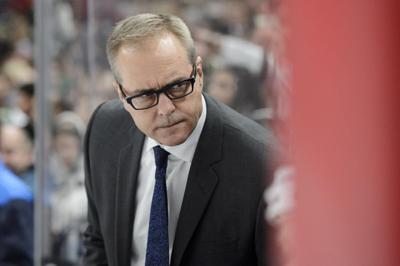The shocking resignation of Paul Maurice as head coach of the Winnipeg Jets on Friday morning caught the hockey world off guard.
Amid COVID-related postponements and hourly reports of players entering protocols around the league, the news came that the coach with the sixth-most wins in NHL history ā second among active coaches behind the Islandersā Barry Trotz ā was leaving his post.
In reality, Maurice might have just been getting ahead of the inevitable.
Rather than wait, he was doing something that professional coaches rarely get to do: He was calling his own shot.
He decided it was time, and he was leaving on his own terms. He had done what he could do with a talented group facing high expectations, and felt he couldnāt push them to another level. It was brutally honest, and speaks to his character.
āThey need a new voice, and I know that,ā Maurice said in a press conference following the announcement. āThere is a shelf life for what we do. The only way that shelf life gets extended is if you win championships. You have to win.ā
The hard part is timing.
The Jets are a very solid team, and many viewed them as a Stanley Cup contender. They got off to a strong 9-3-3 start, then battled through injuries and inconsistent play over the past month before starting to find their stride recently. Lines were beginning to mesh. Things seemed to be solidifying. Yet Maurice thought differently.
He was in the big chair and could see the signs of a team that had peaked under his leadership. Thesearenāt things the casual observer would see, but the head coach knows ā if heās willing to look at the situation through the eyes of his players. Even the best teams, with locker rooms abounding in character, need change.
In his ninth season as Jets coach, with a core that had shown signs of continued growth and flashes of brilliance, he saw something others didnāt. Perhaps the majority of players didnāt even see it, but Maurice did and was willing to admit it.
Perhaps the final sign in making his decision was a look west to Vancouver, where a recent coaching move to bring in veteran Bruce Boudreau has met with significant early success. A different voice is effecting change.
The Canucks were 6-0-0 under their new bench boss heading into the weekend and have pushed their way back into relevance after a dismal start. Players who couldnāt score are all of a sudden finding the net with increased regularity. Everyone is simply better. It is the ultimate ānew coach bump,ā which seems to come with mid-season change behind the bench. The voice is different, even though the message may be similar. Players start to hear the message, when in the past they may not have been listening.
Systems donāt necessarily change, but the play does. Coaching changes bring the opportunity for every player to clean their slate and start fresh, absolved of blame.
The long-term effect in Vancouver remains to be seen. The same is true in Chicago, Florida and Philadelphia, where the other teams that changed coaches midstream this season have found moderate success to date ā the Flyersā move too recent to evaluate.
Coaches, by nature, believe they can effect change. Itās what they do. They make players better. They put pieces together to get the most out of individual talent. They convince players they are capable of more ā faster, harder, more consistent.
Good coaches take stubborn players out of long-established comfort zones. They push and pull and cajole and grind through countless hours, all to lead a team where theyāre not sure they can even go. One more small line adjustment, a couple of key players elevating their game, one more goal at just the right time and the ultimate win can be achieved.
It is all so close, so attainable. A good team is always right on the verge of being great in a coachās eyes.
Thatās what Paul Maurice was willing to walk away from, the challenge of engineering that final stage. It took a lot of courage and understanding to realize he wasnāt the right voice to do that.




















To join the conversation set a first and last name in your user profile.
Sign in or register for free to join the Conversation